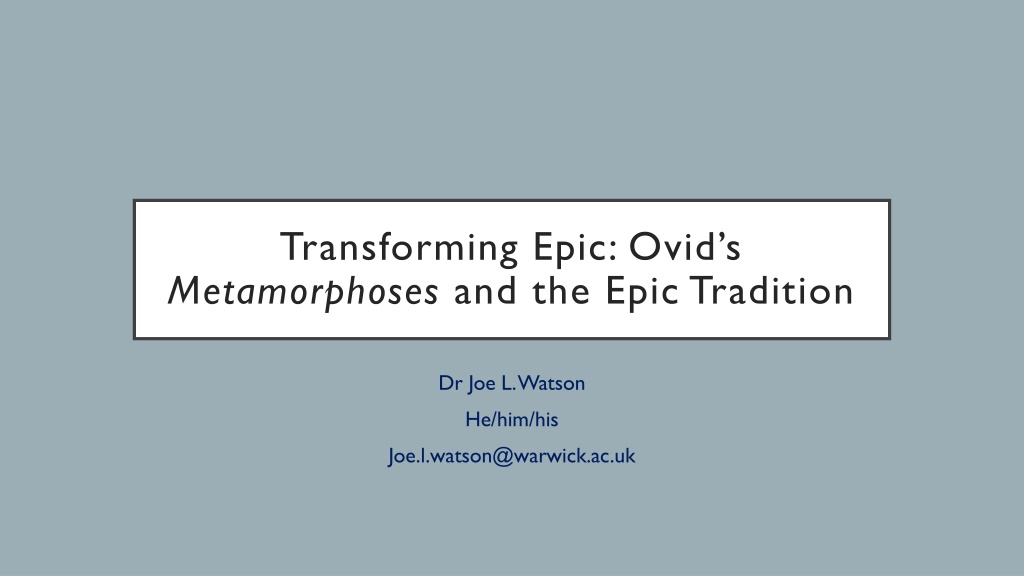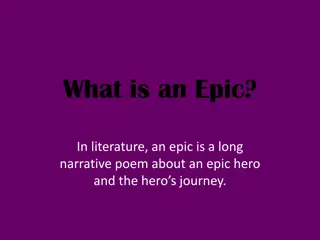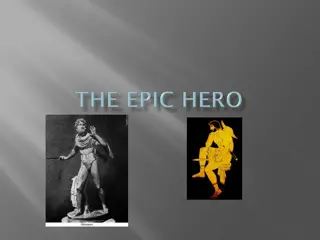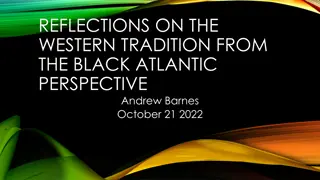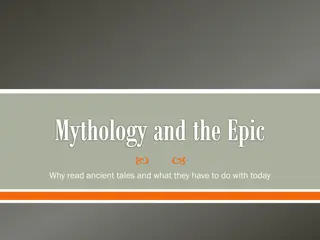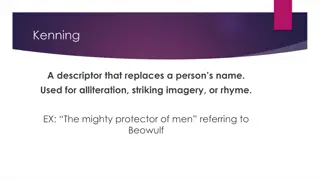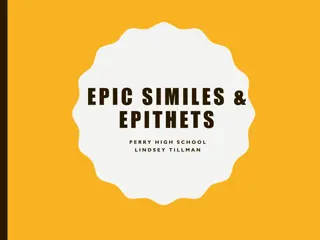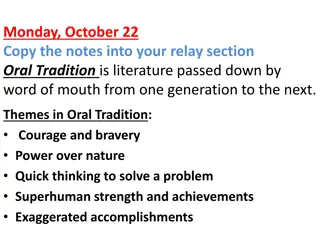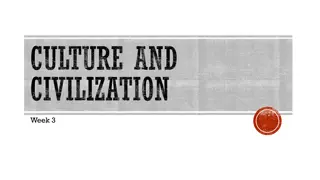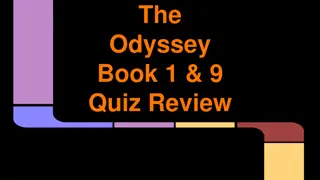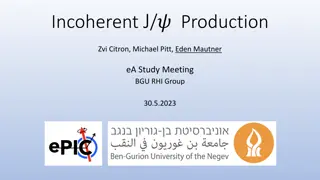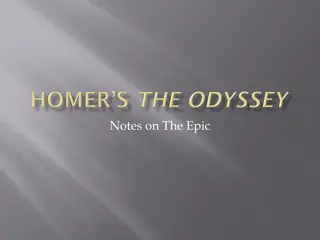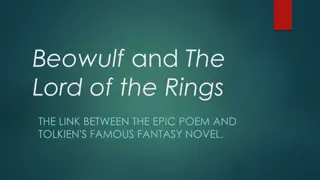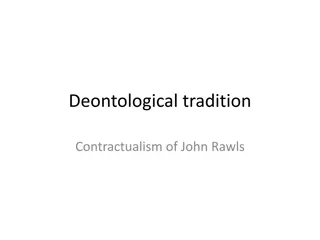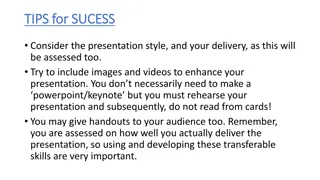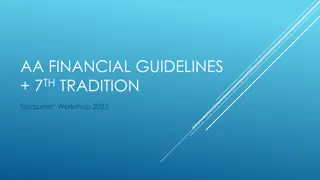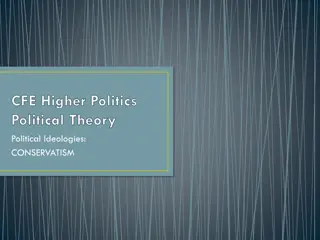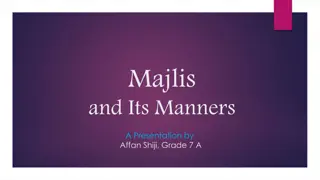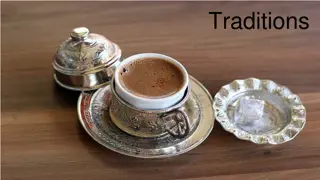Exploring Ovid's Metamorphoses and the Epic Tradition with Dr. Joe L. Watson
Dive into the intricate world of Ovid's Metamorphoses with Dr. Joe L. Watson, a knowledgeable Teaching Fellow in Latin Literature and Language. Discover the nuances of this epic poem, its relation to classical epics, and the exploration of themes such as gender, sexuality, and classical reception. Journey through the stories of mythological transformations and unravel the essence of epic storytelling in Ovid's work.
Uploaded on Aug 22, 2024 | 2 Views
Download Presentation

Please find below an Image/Link to download the presentation.
The content on the website is provided AS IS for your information and personal use only. It may not be sold, licensed, or shared on other websites without obtaining consent from the author. Download presentation by click this link. If you encounter any issues during the download, it is possible that the publisher has removed the file from their server.
E N D
Presentation Transcript
Transforming Epic: Ovids Metamorphoses and the Epic Tradition Dr Joe L. Watson He/him/his Joe.l.watson@warwick.ac.uk
Teaching Fellow in Latin Literature and Language Former Latin school teacher in the North East Research Latin epic (especially Ovid s Metamorphoses) Latin love poetry (especially Ovid and Propertius) Epyllia (esp. the Ciris and the Europa) Intertextuality Gender, sex and sexuality Queer Classical reception ME
Asking / thinking about what epic *is* Exploring what Ovid is doing with epic in the Metamorphoses TODAY Case studies Opening of the Met. Atalanta (Books 8 and 10)
The Metamorphoses: Ovids Epic?
What Is Ovids Metamorphoses? Written c. 8 CE* Epic poem(?) about change 15 books Cf. Iliad and Odyssey (24 books) and Aeneid (12 books) Around 250 mythological stories Some short (half a line), some long (300+ lines) From the creation of the universe (just before) Ovid s lifetime * Contentious: 8 CE is the earliest date, but many (including me) think it s later.
What Might Epic Mean For Ovid? In the image of Homer s Iliad and Odyssey? In the image of Virgil s Aeneid? A bit of both?
How Do Epic Poems Begin? Goddess, sing for me the rage of Achilles, son of Peleus - Homer Iliad 1.1 Muse, tell me about that tricky man, who many troubles - Homer Odyssey 1.1 I sing of arms and the man, who first, who first from the shores of Troy - Virgil Aeneid 1.1
How Do Epic Poems Begin? Goddess, sing for me the rage of Achilles, son of Peleus - Homer Iliad 1.1 Muse, tell me about that tricky man, who many troubles - Homer Odyssey 1.1 I sing of arms and the man, who first, who first from the shores of Troy - Virgil Aeneid 1.1 - Subject matter stated - Invocation of the Muse (Greek) - Declaration of personal creativity (Virgil)
How Does the Met. Begin? Goddess, sing for me the rage of Achilles, son of Peleus - Homer Iliad 1.1 My mind turns to speaking of shapes transformed into new bodies; gods, breathe life into my beginnings (for you have even transformed them) and spin out my continuous poem from the first start of the universe to my own times. Muse, tell me about that tricky man, who many troubles - Homer Odyssey 1.1 in nova fert animus mutatas dicere formas corpora; di coeptis (nam vos mutastis et illa) aspirate meis primaque ab origine mundi ad mea perpetuum deducite tempora carmen. I sing of arms and the man, who first, who first from the shores of Troy - Virgil Aeneid 1.1 - Subject matter stated - Invocation of the Muse (Greek) - Declaration of personal creativity (Virgil)
How Does Ovid *Differ* from Other Epics? My mind turns to speaking of shapes transformed into new bodies; gods, breathe life into my beginnings (for you have even transformed them) and spin out my continuous poem from the first start of the universe to my own times. in nova fert animus mutatas dicere formas corpora; di coeptis (nam vos mutastis et illa) aspirate meis primaque ab origine mundi ad mea perpetuum deducite tempora carmen.
My mind turns to speaking of shapes transformed into new bodies; gods, breathe life into my beginnings (for you have even transformed them) and spin out my continuous poem from the first start of the universe to my own times. in nova fert animus mutatas dicere formas corpora; di coeptis (nam vos mutastis et illa) aspirate meis primaque ab origine mundi ad mea perpetuum deducite tempora carmen. Continuous poem (perpetuum carmen) Suggests very traditionally epic Translation of Callimachus description of epic at Aetia fr. 1.1: I know that the Telchines, who are stupid and no friends of the Muse, grumble at my poetry, because I did not accomplish one continuous poem ( )of many thousands of lines on kings or heroes Spin out (deducite) Suggests very innovative or unepic epic Picks up on how Virgil describes unepic poetry at Eclogue 6.5: When I sang of kings and battles Diana grabbed my ear and warned me: Tityrus, a shepherd should graze fat sheep, but sing a spun-out song (deductum carmen)
deducite carmen perpetuum (Spin out a continuous poem ) Homeric, traditional epic Innovative, unepic epic Ovid s Met.
Racing against Epic: Ovids Atalanta
Epic And Gender The Epic Of Man Sing to me of the twisty man, Muse, who many evils - Homer Odyssey 1.1 Arms and the man I sing, who first from the shores of Troy - Virgil Aeneid 1.1 When I was singing of kings and battles - Virgil Eclogues 6.3 Deeds of kings and generals and sad wars - Horace Art of Poetry 73 The genre of epic is very closely associated with men and traditionally masculine activities Generically speaking, this is not a genre that concerns itself with women or traditionally feminine activities
BUT! Epic poetry has women E.g. Andromache, Hecuba and Helen in the Iliad But, these women usually stay within their assigned gender roles E.g. Homer Iliad 6.490-92: once you ve entered the house, attend to your own work, the loom and the distaff, and command your handmaidens to carry out their work Do you know of any women in epic poetry who do not conform to the expectations men have of them?
Virgils Camilla? Plenty of other warrior women / non-traditionally feminine women, both mortal and divine (e.g.): The Furies The Sirens Circe The Amazons Goddesses like Diana / Minerva Amata (in the Aeneid) Francesco de Mura (1765) Agreement between Camilla and Turnus
Who Is Atalanta? Name of two heroines Very similar myths and often conflated in literature / material culture Arcadian Atalanta Calydonian boar hunt Book 8 Argonaut (?) Boeotian Atalanta Foot race against a man named Hippomenes Book 10 Ovid tells both in the Met.!
One of a series of Pan- Hellenic myths myths that involve heroes from all over the Greek world TrojanWar Argonautica Lead by Meleager Troop of heroes set to kill a wild boar send by Diana Including (Arcadian) Atalanta The Calydonian Boar Hunt
At last Meleager and a handpicked group of men gather, longing for glory: Castor and Polydeuces, the Dioscuri, one son famous for boxing, the other for horsemanship: Jason who built the first ship: Theseus and Piritho s, fortunate in friendship: Plexippus and Toxeus, the sons of Thestius, Meleager s uncles: and the sons of Aphareus, Lynceus and swift Idas; Caeneus, once a woman: warlike Leucippus: Acastus, famed for his javelin: Hippotho s: Dryas: Phoenix, Amyntor s son: Eurytus and Cleatus, the sons of Actor: and Phyleus, sent by Elis. Telamon was there, and Peleus, father of the great Achilles: with Admetus, the son of Pheres, and Iola s from Boeotia were energetic Eurytion and Echion unbeaten at running: and Lelex from Locria, Panopeus, Hyleus, and daring Hippasus: Nestor, still in the prime of life: and those that Hippoco n sent, with Enaesimus, from ancient Amyclae: La rtes, Penelope s father-in-law with Ancaeus of Arcady: Mopsus, the shrewd son of Ampyx: and Amphiara s, son of Oecleus, not yet betrayed by his wife, Eriphyle. Introducing The Hunt: Ovid Metamorphoses 8.299-317
How does the appearance of Atalanta undercut the previous epic catalogue? Undercut: Atalanta (Ov. Met. 8.317-28) And, glory of the Arcadian forests, Tegean Atalanta: A polished brooch fastened the top of her clothing, Her hair was simple, gathered up into a single knot. Dangling from her left shoulder, an ivory quiver Of arrows clattered, and she held a bow in her left hand: Such was her outfit; her face you could say truly Would be girlish in a boy, yet boyish in a girl. As soon as he saw her, the Calydonian hero, Meleager, Desired her, despite divine disapproval, and drank in secret Fires and said Oh happy man, whomever she thinks Worthy enough! And neither time nor shame allowed him To say more: the greater work of the great contest pushes on. nemorisque decus Tegeaea Lycaei: rasilis huic summam mordebat fibula vestem, crinis erat simplex, nodum conlectus in unum, ex umero pendens resonabat eburnea laevo telorum custos, arcum quoque laeva tenebat; talis erat cultus; facies, quam dicere vere virgineam in puero, puerilem in virgine possis. hanc pariter vidit, pariter Calydonius heros optavit renuente deo flammasque latentes hausit et o felix, siquem dignabitur inquit ista virum! nec plura sinit tempusque pudorque dicere: maius opus magni certaminis urget.
And, glory of the Arcadian forests, Tegean Atalanta: A polished brooch fastened the top of her clothing, Her hair was simple, gathered up into a single knot. Dangling from her left shoulder, an ivory quiver Of arrows clattered, and she held a bow in her left hand: Such was her outfit; her face you could say truly Would be girlish in a boy, yet boyish in a girl. As soon as he saw her, the Calydonian hero, Meleager, Desired her, despite divine disapproval, and drank in secret Fires and said Oh happy man, whomever she thinks Worthy enough! And neither time nor shame allowed him To say more: the greater work of the great contest pushes on. nemorisque decus Tegeaea Lycaei: rasilis huic summam mordebat fibula vestem, crinis erat simplex, nodum conlectus in unum, ex umero pendens resonabat eburnea laevo telorum custos, arcum quoque laeva tenebat; talis erat cultus; facies, quam dicere vere virgineam in puero, puerilem in virgine possis. hanc pariter vidit, pariter Calydonius heros optavit renuente deo flammasque latentes hausit et o felix, siquem dignabitur inquit ista virum! nec plura sinit tempusque pudorque dicere: maius opus magni certaminis urget. I shall speak of bristling battles, Of battles and kings driven to doom by their spirits, An army from Tyrrhenia and all of Hesperia united by war For me, a greater order of things is now being born, I begin a greater work. dicam horrida bella, dicam acies actosque animis in funera reges, Tyrrhenamque manum totamque sub arma coactam Hesperiam. maior rerum mihi nascitur ordo, maius opus moveo. - Virgil Aeneid 7.41-45
(Un)Epic Appearances (Ov. Met. 8.317-28) And, glory of the Arcadian forests, Tegean Atalanta: A polished brooch fastened the top of her clothing, Her hair was simple, gathered up into a single knot. Dangling from her left shoulder, an ivory quiver Of arrows clattered, and she held a bow in her left hand: Such was her outfit; her face you could say truly Would be girlish in a boy, yet boyish in a girl. As soon as he saw her, the Calydonian hero, Meleager, Desired her, despite divine disapproval, and drank in secret Fires and said Oh happy man, whomever she thinks Worthy enough! And neither time nor shame allowed him To say more: the greater work of the great contest pushes on. nemorisque decus Tegeaea Lycaei: rasilis huic summam mordebat fibula vestem, crinis erat simplex, nodum conlectus in unum, ex umero pendens resonabat eburnea laevo telorum custos, arcum quoque laeva tenebat; talis erat cultus; facies, quam dicere vere virgineam in puero, puerilem in virgine possis. hanc pariter vidit, pariter Calydonius heros optavit renuente deo flammasque latentes hausit et o felix, siquem dignabitur inquit ista virum! nec plura sinit tempusque pudorque dicere: maius opus magni certaminis urget.
FOOD FOR THOUGHT Epic poetry especially Roman epic poetry sometimes has unepic elements Ovid s Metamorphoses especially shows mixing of genres What does it mean for our understanding of epic poetry that it can contain elements of other genres? In the epic poems you know / have read, can you think of any passages that might seem unepic? Where? What characters / story beats?
